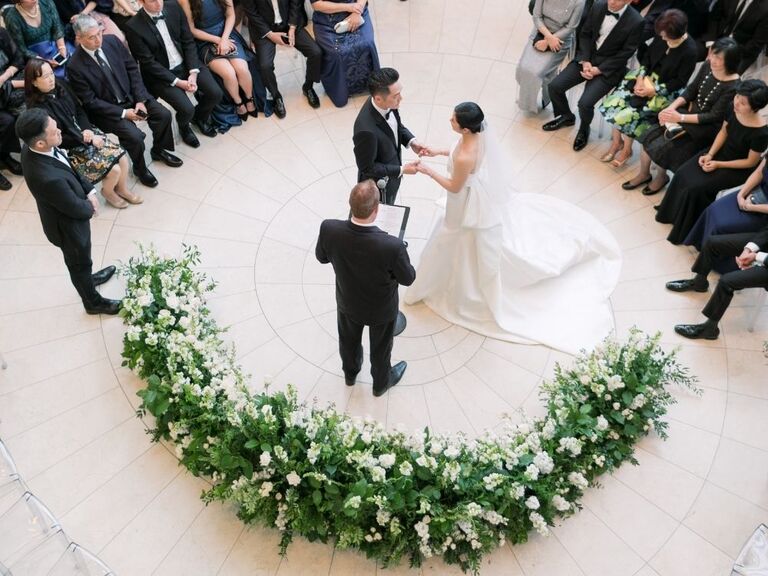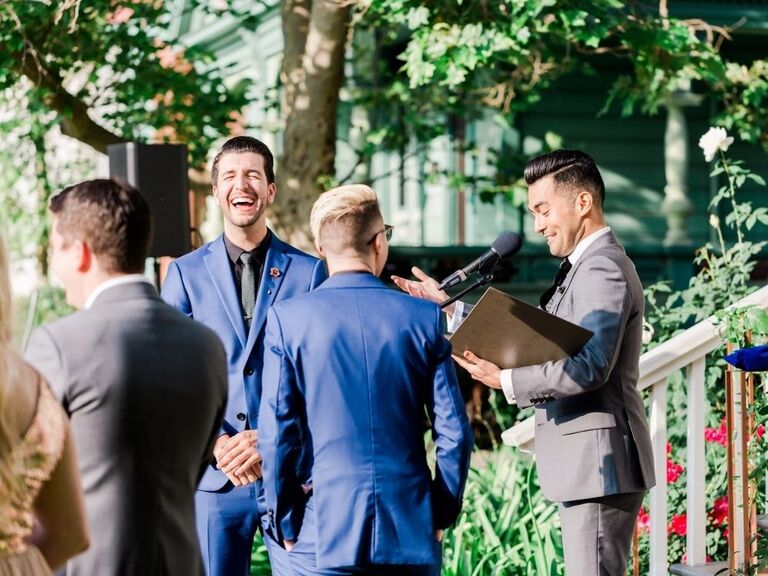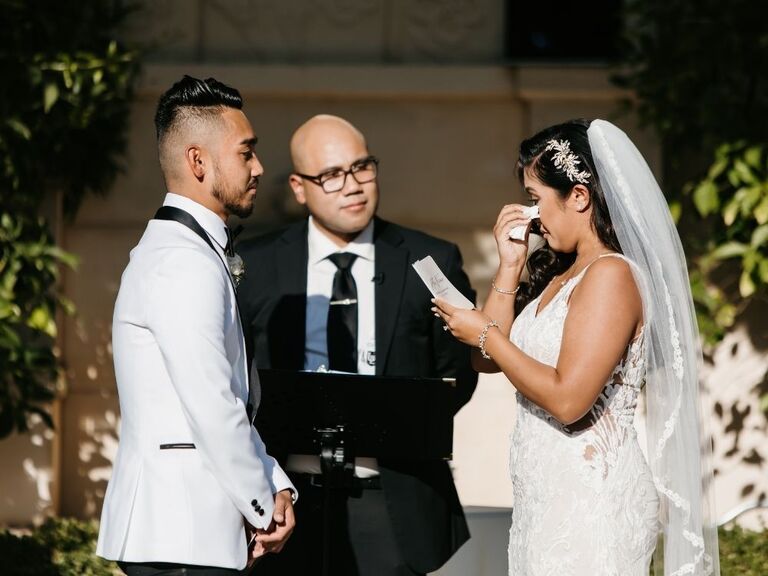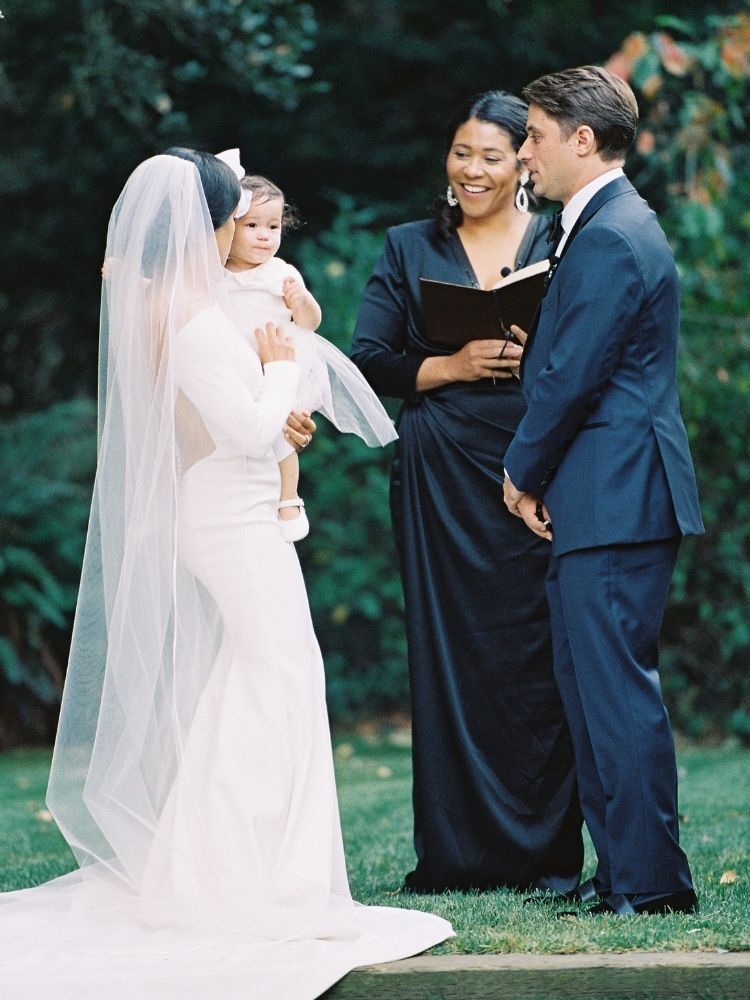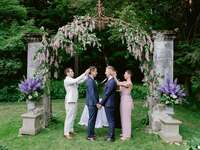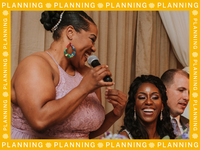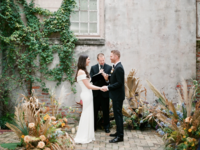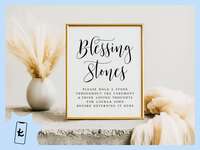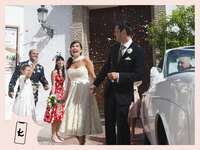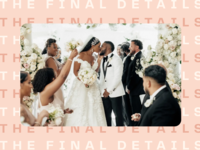The Ultimate Guide to Non-Religious Wedding Ceremony Scripts
For couples planning a religious ceremony as part of their big day, their faith tradition generally dictates the format of the program and the elements a couple needs to include in the vow exchange. However, for nontraditional or non-religious ceremonies, the options are much looser as there's nothing that has to be included beyond what's legally required by the governing jurisdiction of your wedding locale. While the freedom and flexibility to customize a wedding program is exciting for many, the task of writing out a wedding script to mark the beginning of your new life as a married couple can also prove daunting. What should you say? Should you include readings or perhaps a unity ceremony? Don't fret—we are here to help you answer these very questions. Plus, we spoke with some of our favorite wedding professionals about their expert advice for crafting a secular ceremony script. Below you'll find expert tips and frequently asked questions, plus a sample secular wedding ceremony script you can copy and customize for your own non-religious wedding ceremony program.
In this story:
- Non-Religious Wedding Ceremony Script FAQs
- How to Write a Non-Religious Wedding Ceremony Script
- Secular Script for a Wedding Ceremony
Non-Religious Wedding Ceremony Script FAQs
Before launching into writing your secular ceremony script, it's important to understand what the process involves and what elements you need to include. Understanding these frequently asked questions will help your bring your wedding ceremony ideas to life as you write your service.
What is a non-religious wedding ceremony?
Simply put a non-religious wedding ceremony is a wedding ceremony that is legally binding, but does not incorporate faith traditions or follow a religious format. Brian Franklin, founder of Vows & Speeches notes that "when you're not constrained by a pre-written ceremony, you have an opportunity to craft something unique to you as a couple that both tells your story and captures your personality. Not having to follow religious doctrine also allows you to insert humor and creativity into the proceedings—from referencing favorite songs or movies to pouring each other tequila shots or anything else that speaks to your interests."
What needs to be included in a secular ceremony to make it legal?
Wedding laws vary by jurisdiction, from state to state and from country to country. As such, it's important to understand the marriage laws and rules that exist at your wedding destination. Most commonly, a wedding license must be obtained and your wedding ceremony must be overseen by someone who is certified by the state to officiate weddings.
Beyond a legally qualified officiant and a marriage license, the requirements for the actual ceremony script also differ by area. Generally speaking, there aren't many requirements, but a declaration of intent is typically required. Like with any legally binding contract, the desire to enter into the contract has to be established and that's what a declaration of intent does.
The best course of action for to-be-weds is to research the laws of their wedding locale and then partner with their officiant to craft the perfect wedding ceremony script to meet their needs.
How to Write a Non-Religious Wedding Ceremony Script
Once you've researched the legally required elements for your wedding, the rest of the ceremony framework is totally up to you. Working alongside your wedding officiant, you can plan out a ceremony that's as long or as short as you want. "Far too many non-religious weddings are so bare bones that the couple hardly gets a chance to settle in and feel the life-changing moment," notes Maureen Cotton, coach and officiant with The Soulful Wedding. "Non-religious couples should get to experience the meaning of the moment just as deeply as religious couples. When comparing a religious and non-religious wedding, it's not so much about them having different elements, but rather about those elements being expressed in different ways."
"When working with a wedding officiant to create a unique, customized wedding script, couples should be as open as possible," says North Dakota-based officiant Amber Olsen. "The officiant will ask questions about your relationship and why you fell in love with the other person. The more details you can share with your officiant about your relationship, the more detailed and customized your wedding ceremony will be."
Being open with your officiant will also help them guide you more successfully toward the type of modern wedding ceremony you want for your wedding day. "An important piece to creating a non-religious ceremony is understanding what the couple wants and what they believe," explains Jamie Chang, owner and destination wedding planner at Mango Muse Events. "Just because the ceremony isn't religious, doesn't mean they don't believe in God or aren't spiritual. Or it could mean exactly that. It's important to understand what the couple wants to be included and what they don't in order to begin creating something that is personal and meaningful to them as they enter married life."


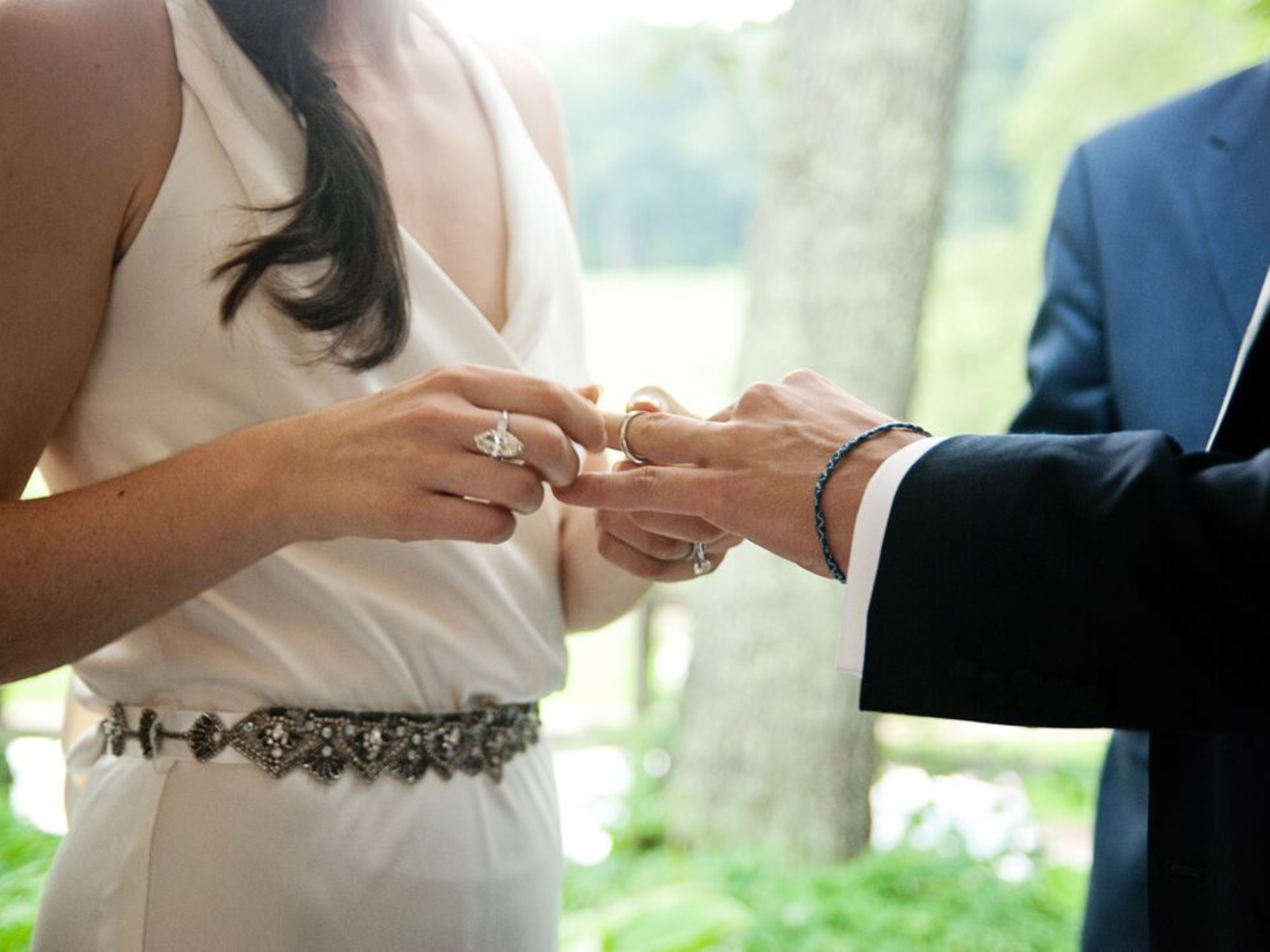
"One of the best ways to create a personalized ceremony is for couples to write their own vows," says Reverend Dr. Samora Smith, a New York-based wedding officiant. "Most couples today are looking for a unique take on an old tradition. Ceremonies can include the time-honored traditions of vows and rings while also reflecting the unique qualities of each couple." When planning your ceremony, your officiant can help identify which aspects of traditional wedding vows are most important to you, along with ways to make your script work for personalization purposes. "Couples who want their ceremonies personalized can also include their children or family members, or they can share stories from early in their relationship," suggests Mathew Anderson, a non-denominational wedding minister.
Ultimately, what matters most is that your wedding ceremony feels personal. Guests will remember a nontraditional or non-religious wedding ceremony that speaks to who you are as a couple. And, with the help of your officiant, you can create a script that's modern and fun while honoring the most sacred aspects of a marriage ceremony.
The Knot Expert Tip: "It is important to consider not only what you and your partner want for your ceremony, but also what your guests are comfortable with and what they would recognize and understand as a wedding ceremony," advises wedding planning expert Janice Carnevale of Bellwether Events. "You don't want your guests to leave your wedding ceremony feeling confused, you want them to leave feeling full of joy and love."
Secular Script for a Wedding Ceremony
"A good ceremony will tell the story of the relationship, go into the aspects that each of the couple love about each other, provide some perspective and guidance about marriage in general, the vows (either spoken by the officiant or the couple), some 'do you take' language that allows them to say 'I do,' the rings, a declaration of marriage by the officiant, and, of course, the kiss," explains Franklin of the elements generally included in a secular wedding ceremony. As you're preparing for your own wedding, let this sample wedding ceremony inform your writing.
Processional and Invocation
"For the processional, typically you seat grandparents, then parents," suggests Carnevale. "Next, the officiant and one of the marriers would come out with their attendants. After, the rest of the wedding attendants will come out, followed by the second marrier."
Officiant to wedding guests: Welcome, you may be seated.
Dearly beloved, friend and loved ones, we are gathered here today to celebrate the marriage of [couple].
"Once guests are seated, welcome remarks from the officiant are appropriate," advises Carnevale. "If you wish for there to be wedding readings given by friends or family members, those can be done after the welcome." Additionally, if you're planning to include a unity ceremony, such as a sand ceremony or handfasting, that ceremony element can take place at this point in the service.
Secular Wedding Vows Script and Declaration of Intent
"Now that the tone is set for your wedding ceremony, you can turn to the official stuff," explains Carnevale. "First is typically a declaration of intent. This is a verbal acknowledgment that you have come here today of your own free will and with the intent to marry the person standing next to you. Next is the perfect time for the exchange of vows. You can read them from notes, or have the officiant do a call and repeat them with you. They can be totally free form, and independent of what your future spouse is going to say. Or they can be more structured, and identical for both marriers."
Cotton adds that "legally speaking, the most critical moment is the declaration of intent. This is the moment when you affirm who you are and that you are willfully entering this union. It's typically phrased so that the confirmation is 'I do!'"
Officiant to first marrier: Do you take [name] to be your partner, to live together in matrimony/ the union of marriage, to love them, to honor them, to comfort them, and to keep them in sickness and in health, forsaking all others, for the rest of your lives, as long as you both shall live?
Marrier: I do.
(repeat with second marrier)
Officiant to first marrier: Repeat after me—I, [name], take you [name], to be my spouse, best friend and confidant, to have and to hold from this day forward, for better, for worse, for richer, for poorer, in sickness and in health, to love and to cherish, till death do us part.
(repeat with second marrier)
Ring Exchange
After the couple has exchanged vows and declared their intention to wed, it is time for the exchange of rings.
Officiant gives the marrier their spouse's wedding ring and asks them to repeat after them as they place the ring on their partner's finger:
I give you this ring as a symbol of my love and commitment.
(repeat the process with the second marrier)
Pronouncement and Recessional
"At this point, the marriage is generally considered official, and the officiant can declare or pronounce you married! Tack on a first kiss, and the ceremony is basically complete," explains Carnevale.
Officiant: By virtue of the authority vested in me under the laws of [location], I now pronounce you married. You may share a kiss.
It is my pleasure to present to you, for the first time as newlyweds, [names].
